| Srl | Item |
| 1 |
ID:
137717
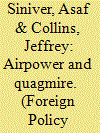

|
|
|
|
|
| Summary/Abstract |
This paper assesses the role that analogical reasoning played in Israel's decision making during the 2006 Second Lebanon War with Hezbollah. Two analogies seemed to dominate internal deliberations: the “air power superiority” analogy which drew on more than a decade of developments in military theory and the air-based campaigns of the two Gulf wars and the Balkan wars of the mid-1990s and late 1990s; and the “Lebanese quagmire” analogy which drew on Israel's own traumatic experience of Israel following the its first war in Lebanon in 1982. The misuse of these analogies by the Israeli political–military leadership during the war produced a myopic approach which advocated an almost total reliance on air power rather than ground maneuver to win the war and refrained from using ground forces for fear of entering another bloody and unpopular war in Lebanon. The constraining power of these analogies prevented the consideration of alternative courses of action or the effective calculation of cost-benefit analysis during the war. Whereas previous studies of the war provided various explanations to singular decisions or episodes, this paper shows that the air power and quagmire analogies contained the conceptual boundaries of Israeli decision making during the war and thus best explain its attraction and limitations.
|
|
|
|
|
|
|
|
|
|
|
|
|
|
|
|
| 2 |
ID:
111152
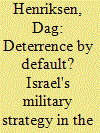

|
|
|
|
|
| Publication |
2012.
|
| Summary/Abstract |
This article explores the question: What was Israel's military strategy when it went to war against Hizballah and Lebanon in 2006? It argues that Israel's decision to go to war was not based on a thorough in-depth analysis of the specific situation at hand, but rather rooted in its strategic outlook cultivated in the decades preceding the war. This thinking has largely focused on the concept of deterrence, and should deterrence fail, to restore deterrence and ensure that the opponent would refrain from similar actions in the future. The need to have a clear political component - which the military effort should support - appears to have been significantly less in focus. Thus an almost pre-destined recipe of responding militarily 'dramatically beyond the expectations of the enemy' was put in action from the outset. The perception that a more specifically tailored military strategy was not needed was a miscalculation.
|
|
|
|
|
|
|
|
|
|
|
|
|
|
|
|
| 3 |
ID:
126725
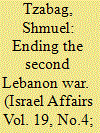

|
|
|
|
|
| Publication |
2013.
|
| Summary/Abstract |
The termination of the Second Lebanon War (2006) is among the most unusual in wars between Israel and Arab states. A classic example of an asymmetrical confrontation between a sovereign state and a guerrilla organization controlling part of a neighbouring state and operating against its will by means of terrorism, the war had far-reaching ramifications for Israeli decision makers in terms of defining the enemy and setting the termination goals of the conflict. In this respect great significance is attributed to the influence of the interface between the military and political echelons on formulating the war's termination strategy, especially in light of the high status enjoyed by the military in Israeli democracy.
|
|
|
|
|
|
|
|
|
|
|
|
|
|
|
|
| 4 |
ID:
080864
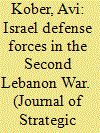

|
|
|
|
|
| Publication |
2008.
|
| Summary/Abstract |
Whereas in the past, Israeli successes on the battlefield compensated for deterrence and/or early warning failures, in the Second Lebanon War serious problems in Israeli military capabilities and conduct of war were exposed. The article offers explanations for the poor performance of the Israel Defense Forces (IDF): A late perception that it was war; adherence to post-heroic warfare under circumstances that rather required a different approach; the erosion of the IDF's fighting standards due to policing missions which had become its main task since the outbreak of the first Intifada in 1987; false Revolution in Military Affairs-inspired concepts; the adoption of the notion of controlling instead of capturing territory; a centralized logistic system; poor generalship; a hesitant and inexperienced political leadership, and IDF dominance in decisions on military matters
|
|
|
|
|
|
|
|
|
|
|
|
|
|
|
|
| 5 |
ID:
109954
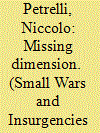

|
|
|
|
|
| Publication |
2012.
|
| Summary/Abstract |
In the course of the 2006 Lebanon War the Israel Defense Forces (IDF) employed special operations forces (SOF) for raids against Hizb'allah's command and control structure. This article argues that a faulty conceptualization of the value of special operations and misguided expectations determined by the new IDF concept of operations impacted adversely on the employment of SOF for this kind of operations. Both these elements contributed in turn to substantially degrade SOF performance in the context of the war.
|
|
|
|
|
|
|
|
|
|
|
|
|
|
|
|
| 6 |
ID:
132726
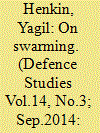

|
|
|
|
|
| Publication |
2014.
|
| Summary/Abstract |
In recent years, the idea of 'swarming' - that is, simultaneous multidirectional attack or maneuver by large number of independent or semi-independent small units - became a subject of a heated debate. Some believe this is the future of warfare, while others see this belief as ridiculous and dangerous. In the Israel Defense Forces (IDF), specifically, swarming was heralded as the new way of war before the 2006 Second Lebanon War. But during and after the war, the word itself was turned into a derogatory term, symbolizing all that was wrong with the IDF's performance: relying on new, untested and unrealistic concepts to pretend that the Army has a silver bullet which will solve its problems quickly and easily, ignoring reality in the process. This article draws on six historical case studies, from the American airborne operation in the Normandy Invasion to the Second Lebanon War, to examine the method of swarming, its relevance and its uses. Finally, the article concludes that Swarming is not a revolutionary method, and not 'The future of conflict'. However it is a very useful method in certain situations, provided that commanders know and understand its possibilities and limitations.
|
|
|
|
|
|
|
|
|
|
|
|
|
|
|
|
| 7 |
ID:
164665
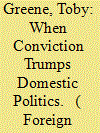

|
|
|
|
|
| Summary/Abstract |
It has been argued that domestic political survival is key to political decision making, including in foreign policy. Poliheuristic decision theory claims that “Politicians will not shoot themselves in the foot by selecting alternatives that are likely to have a negative effect on them politically.” How then does one explain a foreign policy decision which causes grievous harm to the political position of the decision maker? The paper reviews existing research on personality and environmental factors which may reduce the significance of domestic political constraints on foreign policy decisions. It then examines Blair's response to the 2006 Israel-Hezbollah conflict, in which his support for Israel triggered a backbench revolt forcing him to announce he would step down within 12 months. The account demonstrates that Blair was aware of the potential political costs of his position, but stuck to it regardless. By seeking to explain why this case diverges from theoretical expectations, the paper generates new hypotheses about how personality and environmental factors may lead to leadership convictions, and not domestic political survival, being the ‘essence of decision’.
|
|
|
|
|
|
|
|
|
|
|
|
|
|
|
|
| 8 |
ID:
149495
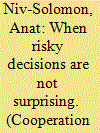

|
|
|
|
|
| Summary/Abstract |
On 12 July 2006, Hezbollah operatives crossed into Israel and attacked a military patrol, killing three soldiers and kidnapping two more. In retaliation to this incident Israel launched a military operation that resulted in 34 days of fighting between Hezbollah and Israel. The Israeli retaliation has been deemed to be severe and surprising. Furthermore, a public investigation commission established by the Israeli government implicated key decision-makers, and especially Prime Minister Olmert, as guilty of hasty and irresponsible decision-making. This article views this case through the lens of prospect theory, showing how the decision was made at the framing stage, and suggesting that this decision was not hasty but, rather, was consistent with the logic of loss-aversion.
|
|
|
|
|
|
|
|
|
|
|
|
|
|
|
|